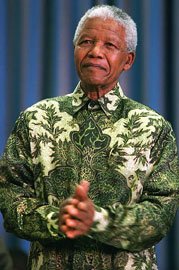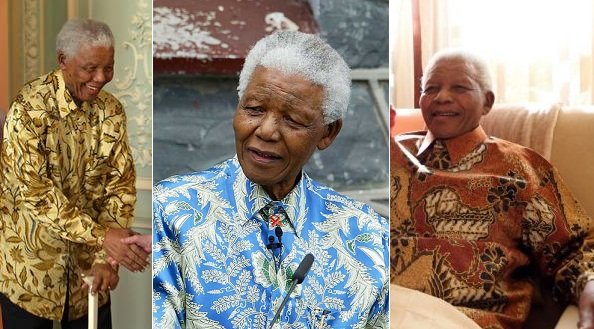
South Africa has lost one of its greatest personalities in our national history.
Personally, I take away the following from the life of Nelson Mandela:
1. His life represented, amongst other qualities: Complete and utter selflessness.
Its a quality that is in very short supply today, and so when we hear about someone, who sacrificed so much for the sake of others, it often takes our breathes away....
Nelson Mandela was a qualified attorney, married and with kids. Although he experienced the injustices of apartheid along with the rest of his people, one could appreciate that he was in a
relatively more comfortable position than many others. Perhaps, he could have left the country for greener pastures, as he had the means to do so.
Yet, he willingly gave this all up - much for the benefit of others.
He lost almost 3 decades of the prime of his life behind bars.
In this time, he endured various forms of mental and physical torture (which resulted in permanent damage to his eyes and lungs, endured from the limestone mines on Robben Island). After imprisonment, his wife at the time, Winnie Mandela, was not allowed contact with him for 8 years, and thereafter was only allowed one family visit and letter every ~6 months. Prisoners were also not allowed to see children under the age of 16 - so he missed out on most of his children's lives, while being behind bars....
These are just some of the sacrifices that he made....it in no way does justice to all that he, as well as his comrades, sacrificed for this country and its people.
2. He struggled for a cause that was close to his heart - he believed in it, and he never sold out, or took the easier road even when he had the chance to do so.
(Not many people know, that during his imprisonment on Robben Island, he was offered numerous opportunities of freedom - in return of leaving behind military struggle against apartheid. He could have succumbed....he could have walked free. But, he refused each and every time!)
At the Rivonia trial, he concluded with these historic words:
"During my lifetime I have dedicated myself to this struggle of the African people. I have fought against White domination, and I have fought against Black domination. I have cherished the ideal of a democratic and free society in which all persons live together in harmony and with equal opportunities.
It is an ideal which I hope to live for and to achieve. But if needs be, it is an ideal for which I am prepared to die."
I think that if we look into own lives, we should ask ourselves: Do we have a cause that we are fighting for so passionately?
As muslims, do we even use half of our energies in the path of Islam - for its dawah and development?
Is there even any 'worldly' good cause that we hold, that we are willing to put as much effort as possible to make a positive and enduring difference?
3. The challenges that come with life often seem insurmountable,
And we often think to ourselves - I'm too small to make a difference....or, This evil is too wide-spread, whats the point of even trying?...
In the words, and actions of the late Nelson Mandela:
“It always seems impossible until it’s done.”
So too, by the will of Allah, South Africa found liberation from minority white, oppressive rule - after decades of struggle, thousands of lives lost and even more, scarred for many generations by a lack of adequate education and basic needs of living.
It didnt seem possible, but it happened - by Allah's will, and by the efforts of those who knew that both individually, and collectively, change
can happen.
It may not occur over-night.
And there may be much losses experienced in its path.
But nothing great ever happened - without a lot struggle.
3. The history of South Africa, and the story of Nelson Mandela highlights that:
a) A tyrannical rule will ALWAYS fall.....Its just a matter of time.
b) Allah can turn circumstances in such a way, that the oppressed become the rulers and the 'terrorist' becomes the hero, and is loved the world over. (Nelson Mandela was only removed from the United States list of 'terrorists' in 2008).
The Pharoahs of the past collapsed.....and they will continue to collapse!
^ And in a similar manner, we should always have hope that Allah can turn our own
individual lives around - even when
we cannot see the light at the end of the tunnel. Its a matter of us bearing patience, perserverance, making the necessary effort, and then trusting in His ultimate plan.
4. Over the course of yesterday, South African TV and radio stations shut down all productions and advertising, and dedicated every minute in 'Celebrating the life of Nelson Mandela'.
His home and many other landmarks were flooded by well-wishers, flowers, cards and other forms of greetings.
People from all colors, religions and backgrounds united by virtue of this iconic man and the legacy that he leaves behind, for the rest of us to enjoy.
And yet, somewhere through the broadcasts, I found myself crying for him.
Not because of his death and departure from this world (as this was expected for the past few months already).
But because, what matters more than ones accomplishments in life, is their accomplishment in the next life.
The world may be 'celebrating his life'.....but, does it matter at all if the actual purpose of this life has not been fulfilled?
If the King of Kings and the Judge of all Judges is ultimately not pleased - because He was not recognized in the process - then the judgements of the 'mini-judges' (ourselves), amounts to naught.
The tears stem from the fact that as muslims, we
do not desire to see any other fellow human in the fires of jahannum.
(Even the prophet (sallalahu alaihi wasalam) was deeply saddened upon the demise of his uncle Abu Talib, as a non-muslim).
However, we believe that Allah is the BEST of all Judges - and He alone knows what was in the heart of the late Nelson Mandela.
In his later years, I am not aware of him ever proclaiming his following to a particular religion (even though he was born into a Christian family), and so, I think that we should leave it to Allah (subhanawataála) to judge his convictions and actions in the most fair and just manner that exists.
(Please allow this thread to be focused upon the life and contributions that the late Nelson Mandela made to society, rather than turning this into a discussion on the final abode of non-muslims.
As indicated by brother Muhammad, there are other threads that have served this purpose. And also to note that the decree of Allah is clear - it is not up for our limited intellects to debate its merits.)
:wa:


 when he returned to his home city of Makkah, home to his bitterest enemies who had spared no effort in trying to harm him, asking God to forgive them and without desiring bloodshed. He too led the way for social reform and justice, such as changing attitudes to slavery and prohibiting practices such as infanticide.
when he returned to his home city of Makkah, home to his bitterest enemies who had spared no effort in trying to harm him, asking God to forgive them and without desiring bloodshed. He too led the way for social reform and justice, such as changing attitudes to slavery and prohibiting practices such as infanticide.


